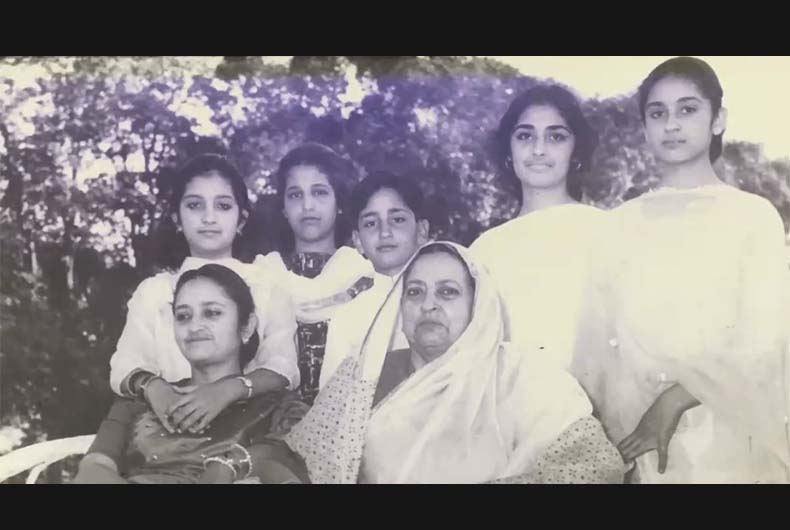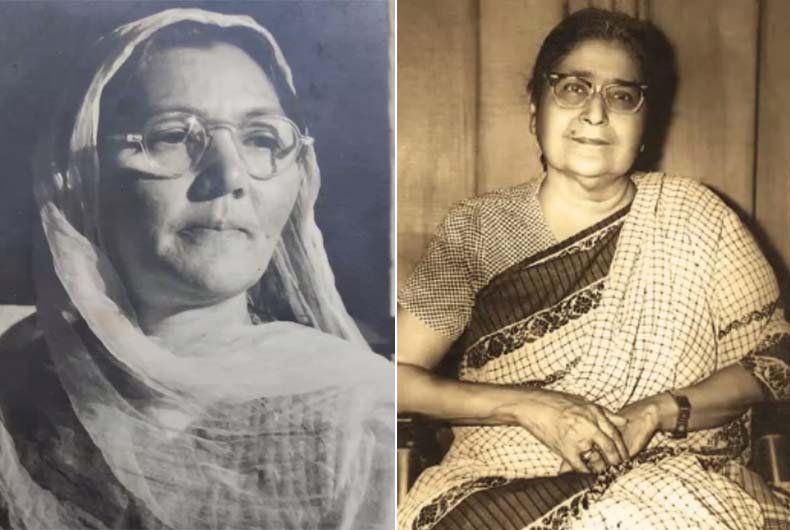NEW DELHI :
(However) The strength these women brought to the cause has sadly never been recorded or acknowledged, Dr Syeda Hameed said.

[Shah Jahan Begum, wife of Dr Zakir Hussain – former President of India and one of the founders of Jamia Millia Islamia in a file photo shared by Dr Syeda Hameed.]
Mumbai:
Highlighting their contribution in the movement the result of which we see today as “Jamia Millia Islamia”, Dr Syeda Hameed said women were a presence and a power in the Jamia from its very inception though it was never acknowledged.
“From its very inception in 1920, women were a presence and a power in Jamia Millia Islamia. But they never emerged as individuals, always overshadowed by men, who were undoubtedly committed, dedicated, and passionate, but so were the women”, Dr Hameed, scholar, author, writer and former member of the Planning Commission of India said while delivering 17th Dr Asghar Ali Engineer Memorial Lecture.
“(However) The strength these women brought to the cause has sadly never been recorded or acknowledged. It’s time to speak of these women, the architects of Jamia”, she said.
During her lecture, Dr Syeda Hameed especially praised and acknowledged the contributions of Nawab Sultan Jahan Begum – the Ruler of the Princely State of Bhopal, Shah Jahan Begum – wife of Dr Zakir Hussain , Asifa Mujeeb – wife of Mohammad Mujeeb, and Saliha Abid Hussain – wife of Syed Abid Hussain.
Calling them “The Khwateen-E-Awwal of Jamia” – the first women of Jamia, Dr. Syeda Hameed also detailed the last Begum’s contributions in the fields of education, sanitation, public health and her efforts in establishing Aligarh Muslim University (AMU), of which she was the founding Chancellor, and the first and only woman to have served in the position.
“(But) their roles have been diminished and their work remains unacknowledged in the mainstream”, she said in her key-note address titled “Contribution of Muslim Women to Educational Institutions: The Case of Khwateen-e-Awwal of Jamia Millia Islamia.”
Dr Hameed quoted from Saliha Abid Hussain’s speech on Jamia’s Foundation Day in the mid-eighties to prove her point.
“I want to speak of (the) women of Jamia who were like Mughal era Raj majdoors behind Emperor Shah Jahan and the Royal Architects who built the Taj Mahal and never, ever thought of etching their names anywhere on the marble”.
Dr. Hameed also detailed the accounts of Saliha Abid Hussain and Gerda Philipsborn – a German national who later became known as “German Appa-Jaan” of the Jamia.
Dr. Syeda Hameed talked of the jalsas they organised, and their journey from attending events behind the pardah to firmly holding their ground and being in “high demand” at traditionally-male dominated intellectual and literary gatherings and their outspokenness about the rights of women in Islam.
Dr. Hameed talked of the unfinished works of Saliha and the final resting place of Gerda and of Professor Sughra Mehdi, who wrote extensively on the two women and on Jamia, and on the need for their works to be made accessible to more people and in more languages.
Dr. Hameed also recalled Turkish Poet and Activist, Halide Edib Adivar’s series of lectures at Jamia Millia in 1935, and of the early days of the Jamia in Okhla, the basic environment, the lack of electricity, of running water, of roads, and of sidewalks.
“By the banks of river Jamuna, houses were built, modest houses. Very limited income, but plenty of enthusiasm and lots of spirit, and a desire to live together as a human family in which women were the binding force.”

While introducing, Begum Asifa, Dr Syeda Hameed detailed how despite coming from a well-to-do family, she chose to live within the means afforded by the newly moved Jamia.
Dr. Hameed’s also remembered the contributions of Begum Syeda Khursheed, who according to her, “was brought up by parents who literally birthed the Jamia” and Shafiqa Kidwai, wife of Shafiqur Rahman Kidwai, former Minister of Education Govt of India. Sahfiqa Kidwai established Balak Mathia Mahal in Delhi for education of girls, and was the member of various apex committees of the Jamia.
“The spirit of the Jamia comes from all these strong and resilient women who collectively built the Jamia and the Muslim women’s movement over decades”, she said.
“That it transcends the test of time and will continue to surface whenever there is a threat to the core values, imbibed in the idea of India, the idea of the university and the idea of Jamia Millia Islamia”, she said.
Professor Zoya Hasan, while throwing more light on the contribution of women in the founding movement of Jamia Millia Islamia talked about Turkish activist, Halide Edib Adivar, who came to Jamia to deliver a series of eight lectures titled ‘Inside India’.
Professor Zoya Hasan said in her lecture series Adivar admired the Jamia movement for its harmonizing intermingling of anti-imperialism and tradition.
“What she found very interesting and impressive was the combination of Indian nationhood with Islamic identity”, Professor Zoya said.
source: http://www.ummid.com / Ummid.com / Home> India / by ummid.com News Network / June 19th, 2021








